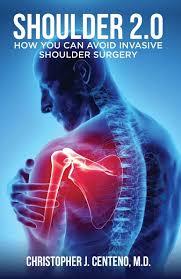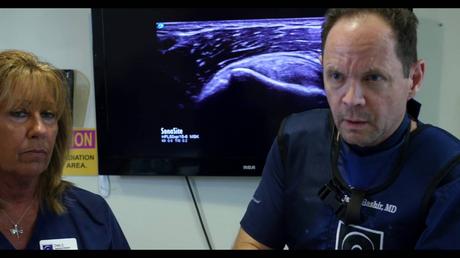Night after night your shoulder pain awakens you. The pain is hot and searing and getting worse. Why does your shoulder hurt at night? Why does your shoulder pain occur at night? What are the treatment options for shoulder pain at night? Are there non-surgical treatment options? Let’s dig in.
Why Does My Shoulder Hurt at NIght?
There are many causes of shoulder pain at night. The major causes include:
Tendonitis
Tendons are thick bands of connective tissue that connect muscle to bone. The rotator cuff is compromised of 4 tendons which are the supraspinatus, infraspinatus, subscapularis, and teres minor. They are susceptible to injury and can become inflamed, degenerated, or torn (1). Common causes of shoulder tendonitis include overuse, repetitive motion, trauma, poor blood flow, and prior surgery (2). Pain is the most frequent symptom which is aggravated by overhead activity. Shoulder pain at night is common with shoulder tendonitis.
Bursitis
A bursa is a fluid-filled sac that allows tendons, ligaments, and muscles to slide smoothly over boney surfaces. There are 6 bursae in the shoulder which can become inflamed and a source of shoulder pain at night (3). Pain is typically aching in character and made worse with movement. Some patients complain of a reduced range of motion. Bursitis is a common source of shoulder pain at night as pressure is applied to the bursae when lying on the affected side.
Osteoarthritis
The shoulder is a ball-socket joint. The joint is lined with cartilage which allows the two bones to easily move together. This in turn allows you all the remarkable movements of the shoulder such as throwing, grabbing, and lifting overhead. Unfortunately, the cartilage can be damaged or eroded leading to shoulder arthritis. Pain, stiffness, and grinding or clicking sounds are common (4). As arthritis advances most patients complain of reduced range of motion and shoulder pain at night.
Shoulder Impingement Syndrome
Shoulder impingement syndrome involves Inflammation of the rotator cuff tendons as they pass through the narrow boney passageway in the shoulder called the subacromial space (5). Pain, weakness, and restriction in range of motion are the most common symptoms (6). Pain typically develops over time and typically is localized on the top of the shoulder with radiations to the side of the arm (7). Shoulder pain at night is common in patients with shoulder impingement syndrome
Neck Injury
Referred pain is pain that is perceived or felt in an area different than the location of the actual injury. For example, disc protrusion or herniations in the neck can cause pain that is referred into the shoulder. Small joints in the neck called facet joints can also refer pain into the shoulder. Facet joints can be injured in motor vehicle accidents or other types of trauma. Finally, nerves in the neck such as the C6 nerve can be compressed or irritated resulting in pain that is referred to the shoulder. Changes in the neck position can cause or aggravate shoulder pain at night.
Why Does This Occur at Night?
There are several reasons why shoulder pain at night occurs or is aggravated. The common explanations include:
- Sleep typically involves a static position lasting hours at a time with little or no movement.
- Sleeping on your side places additional pressure on the tendons and bursa of the shoulder
- Sleep can cause muscles and tendons to settle in a slightly different position resulting in additional pressure and reduced blood flow.
Treatment Options for Shoulder Pain at Night?
Identifying the underlying problem is important! This allows therapy to focus exclusively on the exact problem or problems. When appropriate conservative care is always the first line of treatment. Focus is typically on strengthening and improving range of motion. Please remember that range of motion is KEY!. A stiff joint is a painful joint. When conservative care fails to provide significant improvement many patients are referred for steroid injections. Steroids are very powerful anti-inflammatory agents that are toxic to cartilage and should be avoided (8). Repeated steroid injections can weaken the tendons and ligaments and accelerate arthritis. Each of the outlined causes of shoulder pain at night discussed above has a specific treatment. These treatments are discussed in previous blogs. MRI is useful when conservative treatment fails to provide benefit,
Changing your sleeping position may reduce your shoulder pain. Avoid sleeping on the affected shoulder. Placing a pillow underneath your chest wall can also help reduce the pressure on the shoulder. Placing a firm pillow behind your shoulder to eliminate additional movement and elevation of the head of the bed has been successful for many patients.
Regenerative Treatment Options
PRP and stem cells are effective, nonsurgical treatment options for shoulder arthritis, bursitis, tendonitis, and partial thickness tears in the rotator cuff. Our randomized controlled study examined the use of bone marrow-derived stem cells and demonstrated significant clinical and radiographic improvement in comparison to patients who underwent exercise therapy (9). Disc herniations and bulges that cause referred pain into the shoulder can be treated with PRP and stem cells. This allows patients to avoid the side effects of steroid injection and pain management procedures that burn the nerves in the neck. It also enables patients to avoid shoulder surgery. To learn more about shoulder pain and how you can avoid shoulder surgery click here. This is a free downloadable book written by Dr, Centeno: Shoulder 2.0

At the Centeno-Schultz Clinic, we are experts in the treatment of shoulder injuries. Every new patient examination includes an ultrasound examination of the shoulder. These examinations can identify instability and small defects in the tendons and ligaments not appreciated on MRI or CT. The PRP and stem cell injections are performed under ultrasound guidance to ensure accurate placement of the platelets and stem cells. This will ensure the best clinical outcome. The injections are very demanding and can not be performed by your PCP or orthopedic surgeon. To watch one of my shoulder injections please clinic on the video below.

In Conclusion
Shoulder pain at night can be debilitating. Common causes include tendonitis, bursitis, osteoarthritis, shoulder impingement syndrome, and referred pain from the neck. Possible explanations why this occurs or is aggravated at night include prolonged periods in a static position with additional pressure applied to the shoulder tendons and bursae. The best treatment for shoulder pain at night involves identifying the underlying problem. Then therapy can be focused on correcting the area of damage or irritation. Conservative therapy when appropriate is the first-line therapy. Steroids injections should be avoided as they are toxic. PRP and stem cells are effective, non-surgical options in the treatment of shoulder pain at night. Most importantly shoulder pain at night is an indication that something is wrong and action is required. If left untreated most small problems tend to get larger.
If your shoulder keeps talking to you at night, and or if you are awakened regularly when you roll over at night, please schedule a telemedicine consultation from the comfort of your home or backyard. Speak with a board-certified, fellowship-trained physician who will provide you with a diagnosis and the appropriate regenerative treatment options. Stop suffering and start living by calling today!
1.Factor D, Dale B. Current concepts of rotator cuff tendinopathy. Int J Sports Phys Ther. 2014;9(2):274-288.
2.Spargoli G. TREATMENT OF ROTATOR CUFF TENDINOPATHY AS A CONTRACTILE DYSFUNCTION. A CLINICAL COMMENTARY. Int J Sports Phys Ther. 2019;14(1):148-158.
3.Draghi F, Scudeller L, Draghi AG, Bortolotto C. Prevalence of subacromial-subdeltoid bursitis in shoulder pain: an ultrasonographic study. J Ultrasound. 2015;18(2):151-158. Published 2015 Apr 2. doi:10.1007/s40477-015-0167-0
4.Chillemi C, Franceschini V. Shoulder osteoarthritis. Arthritis. 2013;2013:370231. doi:10.1155/2013/370231
5. Singh B, Bakti N, Gulihar A. Current Concepts in the Diagnosis and Treatment of Shoulder Impingement. Indian J Orthop. 2017;51(5):516-523. doi:10.4103/ortho.IJOrtho_187_17.
6.. Koester MC, George MS, Kuhn JE. Shoulder impingement syndrome. Am J Med. 2005;118(5):452-455. doi:10.1016/j.amjmed.2005.01.040.
7.Consigliere P, Haddo O, Levy O, Sforza G. Subacromial impingement syndrome: management challenges. Orthop Res Rev. 2018;10:83-91. Published 2018 Oct 23. doi:10.2147/ORR.S157864
8. Wernecke C, Braun HJ, Dragoo JL. The Effect of Intra-articular Corticosteroids on Articular Cartilage: A Systematic Review. Orthop J Sports Med. 2015;3(5):2325967115581163. Published 2015 Apr 27. doi:10.1177/2325967115581163
9.Centeno C, Fausel Z, Stemper I, Azuike U, Dodson E. A Randomized Controlled Trial of the Treatment of Rotator Cuff Tears with Bone Marrow Concentrate and Platelet Products Compared to Exercise Therapy: A Midterm Analysis. Stem Cells Int. 2020;2020:5962354. Published 2020 Jan 30. doi:10.1155/2020/5962354

